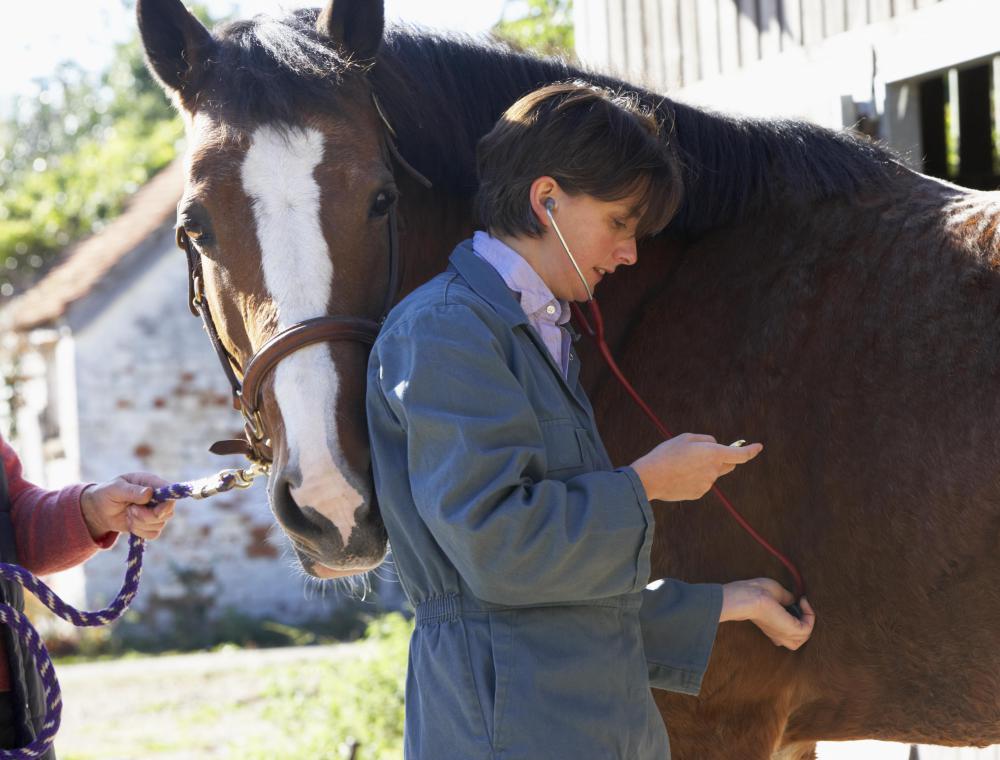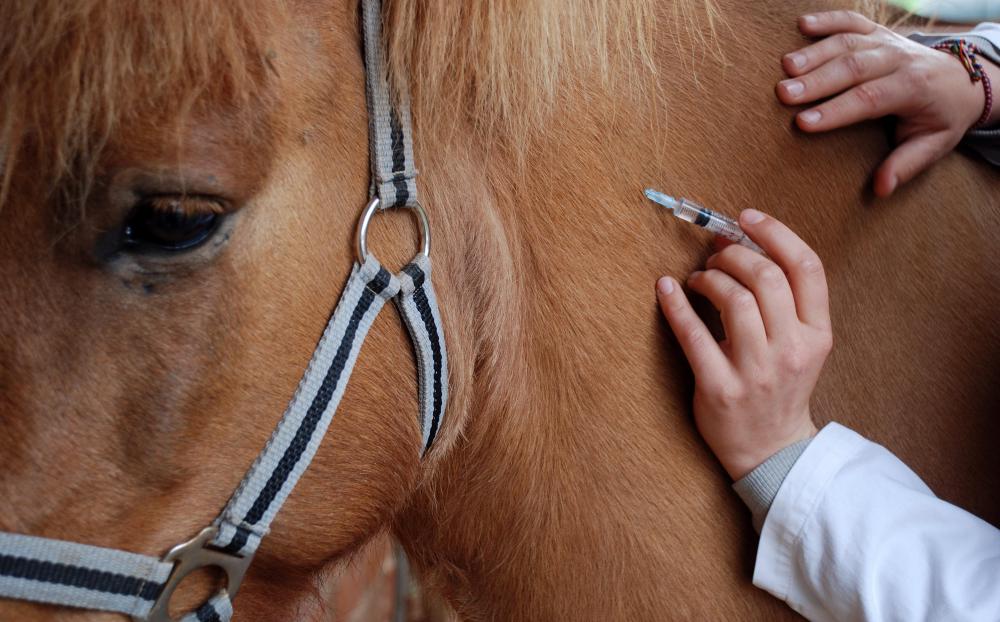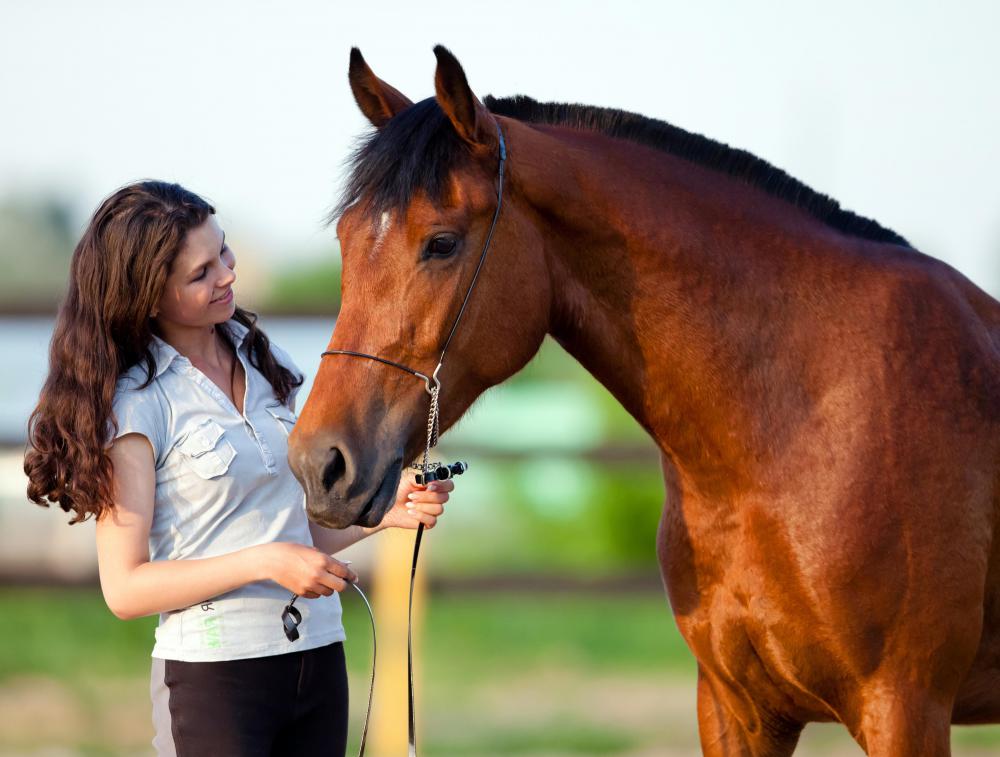At AllThingsNature, we're committed to delivering accurate, trustworthy information. Our expert-authored content is rigorously fact-checked and sourced from credible authorities. Discover how we uphold the highest standards in providing you with reliable knowledge.
What is Equine Influenza?
Equine influenza is an influenza virus that affects horses. While equine influenza is not usually deadly to healthy horses, it can take more than three months for a horse to recover from a serious infection. This disease of horses is considered very contagious, and it can be difficult to distinguish from other diseases of the equine upper respiratory tract. Since it is a viral disease, equine influenza cannot typically be cured, but vaccines are available to protect horses from infection.
Horse flu is generally caused by one of two common subtypes of influenza A, subtype A1 (H7N7) or subtype A2 (H3N8). A1 influenza strains were once implicated in the development of horse flu, but scientists now believe that A1 influenza strains are extinct. The virus typically spreads via the droplets of mucus that fly from a sick horse's mouth when it coughs.

While not usually deadly to healthy horses, equine influenza still presents an economic hardship for stable owners and horse breeders. Horses infected with equine flu must usually be allowed to rest until their symptoms resolve. Most horses recover from the flu within three or four weeks, but it can take some horses up to 100 days to recover from this infection. During this time, horses can't normally be shown, trained, or raced. Horses with equine flu may also rack up veterinary bills, presenting a further financial hardship to their trainers and keepers.

Equine influenza is considered a highly contagious viral disease. Horses are generally considered at the highest risk when they are between one and five years of age, especially if they are exposed to other horses at horse shows, races, or other public events. Other horses at these events may not be vaccinated and may be capable of spreading the flu to unvaccinated animals. Even horses who have been previously vaccinated against equine flu may contract the disease, due to the constantly mutating nature of the influenza virus that causes it.

Symptoms of horse flu are generally limited to the upper respiratory tract. Horses with flu usually cough and may run a fever. Clear mucus may drip from the nose of a horse with the flu. Other infections and conditions, such as pneumonia, can cause similar symptoms in horses. Owners and trainers of horses are generally advised to seek diagnosis from an equine veterinarian, since these other conditions are often far more dangerous than equine flu.

Horses diagnosed with equine influenza are, in the absence of complications, usually prescribed rest. One week of rest is usually recommended for each day that the sick horse suffers a fever. Training, showing, and athletic activity are usually discouraged during the rest period.
Frequently Asked Questions
What is equine influenza and how does it affect horses?
Equine influenza is a highly contagious respiratory disease caused by the equine influenza virus. It affects horses' respiratory tracts, leading to symptoms like coughing, nasal discharge, fever, and lethargy. The virus spreads rapidly among horses through aerosolized droplets when infected animals cough or sneeze, and it can cause significant outbreaks in susceptible populations.
Can equine influenza be transmitted to humans or other animals?
No, equine influenza is a species-specific virus that primarily affects horses and other equids such as donkeys and mules. It does not pose a risk to humans or other animal species. However, humans can mechanically transmit the virus between horses via contaminated hands, clothing, or equipment, emphasizing the need for good biosecurity practices.
What are the signs that a horse might have equine influenza?
A horse with equine influenza typically exhibits flu-like symptoms, including a high fever (often above 38.5°C or 101.5°F), a dry hacking cough, nasal discharge, lethargy, and loss of appetite. In some cases, secondary bacterial infections can occur, leading to more severe respiratory issues such as pneumonia.
How is equine influenza diagnosed and treated?
Diagnosis of equine influenza is based on clinical signs and confirmed through laboratory tests such as PCR, which detects viral RNA in nasal swabs. Treatment focuses on supportive care: rest, hydration, and non-steroidal anti-inflammatory drugs to reduce fever and discomfort. Antibiotics may be prescribed if secondary bacterial infections are suspected.
What measures can be taken to prevent the spread of equine influenza?
Preventing the spread of equine influenza involves vaccination, quarantine of new or sick horses, and good biosecurity practices. Vaccination is key and should follow guidelines set by organizations like the American Association of Equine Practitioners. Quarantine helps isolate infected animals, and biosecurity measures include disinfecting equipment and limiting horse-to-horse contact.
Is there a vaccine for equine influenza, and how effective is it?
Yes, there are vaccines available for equine influenza, and they are an effective tool in preventing the disease. Vaccines help reduce the severity and duration of the illness and limit the spread of the virus. The effectiveness of the vaccine can vary, and booster shots are recommended at least annually, or more frequently for horses at higher risk or in endemic areas.
AS FEATURED ON:
AS FEATURED ON:














Discuss this Article
Post your comments